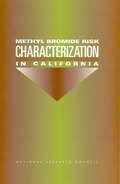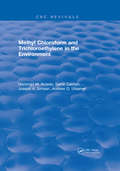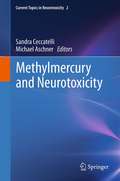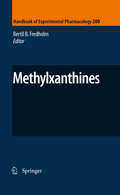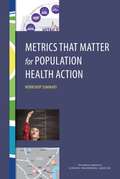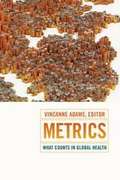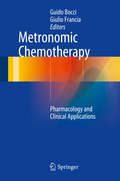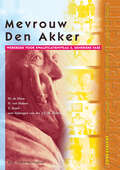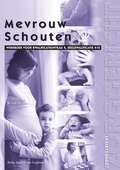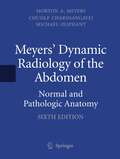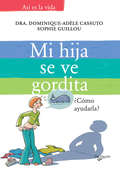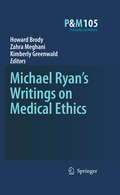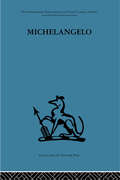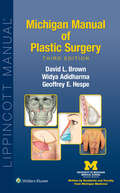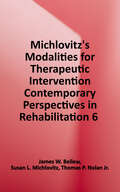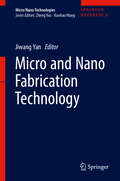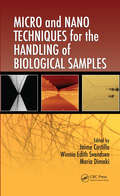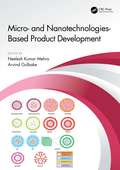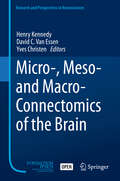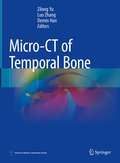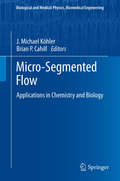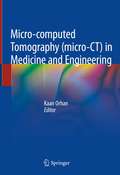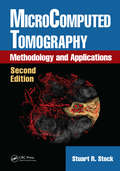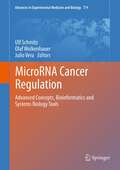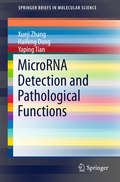- Table View
- List View
Methyl Bromide Risk Characterization In California
by National Research CouncilThe National Academies Press (NAP)--publisher for the National Academies--publishes more than 200 books a year offering the most authoritative views, definitive information, and groundbreaking recommendations on a wide range of topics in science, engineering, and health. Our books are unique in that they are authored by the nation's leading experts in every scientific field.
Methyl Chloroform and Trichloroethylene in the Environment
by D. M. AviadoIn the present and subsequent volumes of this book, critical coverage of the literature will be combined with the fruits of original and highly relevant research carried out by Dr. D.M Aviado and his colleagues. The total effort constitutes an authoritative up-to-date appraisal of the knowledge needed to understand the inhalational toxicity and other biological effects of an important and ubiquitous class of chemical agents.
Methylmercury and Neurotoxicity
by Sandra Ceccatelli Michael AschnerMercury (Hg) is a global pollutant that knows no environmental boundaries. Even the most stringent control of anthropogenic Hg sources will not eliminate exposure given its ubiquitous presence. Exposure to Hg occurs primarily via the food chain due to MeHg's accumulation in fish. Latest US statistics indicate that 46 States have fish consumption advisories. In addition, Hg is a common pollutant in hazardous waste sites, with an estimated 3-4 million children living within one mile of at least one of the 1,300+ active hazardous waste sites in the US. The effects on intellectual function in children prenatally exposed to MeHg via maternal fish consumption have been the subject of two on-going major, prospective, longitudinal studies in the Seychelles and the Faroe Islands. It is important to recognize that the risk for MeHg exposure is not limited only to islanders with high fish consumption. This book will provide state-of-the-art information to the graduate student training in toxicology, risk assessors, researchers and medical providers at large. It is aimed to bring the reader up to date on contemporary issues associated with exposure to methylmercury, from its effects on stem cells and neurons to population studies.
Methylxanthines
by Bertil B. FredholmIn the present volume of the Handbook of Experimental Pharmacology well known experts describe the actions of different xanthines with a focus on caffeine and theophylline. A special chapter is devoted to theobromine, an active component of chocolate, the actions of which are less well characterized. This book also presents the pharmacology of one xanthine derivative, propentofylline, as an example of a xanthine that has gone through extensive development for a novel therapeutic area.
Metrics That Matter for Population Health Action: Workshop Summary
by Engineering Medicine National Academies of SciencesIn times of rapid change and constrained resources, measures that are important, focused, and reliable are vital. However there is an overabundance of measures available for evaluating various aspects of population health and previous efforts to simplify existing sets to meet the needs of all decision makers have been unsuccessful. The National Academies of Sciences, Engineering, and Medicine convened a workshop to explore the status and uses of measures and measurement in the work of improving population health. Participants explored existing and emerging population health metric sets and characteristics of metrics necessary for stakeholder action across multiple sectors. This report summarizes the presentations and discussions from the workshop.
Metrics: What Counts in Global Health
by Vincanne AdamsThis volume's contributors evaluate the accomplishments, limits, and consequences of using quantitative metrics in global health. Whether analyzing maternal mortality rates, the relationships between political goals and metrics data, or the links between health outcomes and a program's fiscal support, the contributors question the ability of metrics to solve global health problems. They capture a moment when global health scholars and practitioners must evaluate the potential effectiveness and pitfalls of different metrics--even as they remain elusive and problematic. Contributors. Vincanne Adams, Susan Erikson, Molly Hales, Pierre Minn, Adeola Oni-Orisan, Carolyn Smith-Morris, Marlee Tichenor, Lily Walkover, Claire L. Wendland
Metronomic Chemotherapy
by Guido Bocci Giulio FranciaThis book analyzes all aspects of metronomic chemotherapy, a new approach involving low-dose, long-term, and frequently administered therapy that has preclinical and clinical activity in various tumors. After an opening section on the pharmacological bases of metronomic chemotherapy, including its antiangiogenic effects and impact on immunity, preclinical studies on various classes of drug are discussed. Clinical applications of metronomic chemotherapy in a wide variety of tumors are then addressed in detail, with description of the results of all published studies. The clinical pharmacology of metronomic chemotherapy is also considered in depth, encompassing pharmacokinetics, pharmacogenetics, pharmacoeconomics, and adverse drug reactions. The book closes by describing the role of this therapy in the veterinarian clinic.
Mevrouw Den Akker
by Y. Smid M. De Haan N. Van HalemHoofdpersoon in de casus is mevrouw Den Akker. Een oudere dame, die na een leven met haar echtgenoot, haar werk, de zorg voor de kinderen en allerlei activiteiten in de samenleving, nu in allerlei opzichten achteruit gaat en verzorgd moet worden. Een dame die je in menig verzorgingshuis zou kunnen tegenkomen. De specifieke zorg voor mevrouw Den Akker op het gebied van voeding en uitscheiding heeft in deze casus met het clusterthema "voeding en uitscheiding" speciaal de aandacht.
Mevrouw Schouten
by Nicolien Van Halem C. OttenZorgcategorie: Kraamvrouw Setting: KraamafdelingKorte inhoud: Bij de meeste vrouwen verlopen de zwangerschap, de bevalling en de kraamperiode zonder problemen, maar niet bij alle. Hanneke Schouten is zo'n vrouw. In de loop van de zwangerschap moet zij steeds meer rekening houden met gezondheidsproblemen. Een geplande thuisbevalling wordt verplaatst naar het ziekenhuis en ook de bevalling en de eerste uren daarna verlopen niet zonder problemen. Hierdoor is ook het kraambed anders en op een andere locatie dan Hanneke en haar man van tevoren bedacht hadden.
Meyers' Dynamic Radiology of the Abdomen: Normal and Pathologic Anatomy
by Morton A. Meyers, MD, FACR, FACG Michael Oliphant, MD, FACR Chusilp Charnsangavej, MD, FSIRThe Sixth Edition continues the tradition of this great book by applying anatomic knowledge to state-of-the-art imaging. Chapters have been reorganized to help the reader better interpret imaging studies by clearly demonstrating what to expect and where to look for disease spread from each individual organ. Up-to-date chapters explore the dynamic concept, explain its embryologic and anatomic basis, and classify the mechanisms of disease progression. The latest imaging modalities, including CT, MRI, ultrasound, and PET, are incorporated throughout.
Mi hija se ve gordita
by Dra. Dominique-Adèle Cassuto Sophie GuillouLa dictadura de la línea hace estragos. En la adolescencia, cuando es habitual y frecuente que el cuerpo se redondee temporalmente, el tema se convierte en una catástrofe. El resultado es que nuestras hijas empiezan dietas de adelgazamiento descabelladas, que ponen en peligro su salud y su crecimiento. Este libro responde a las numerosas preguntas sobre el tema: * Cómo ayudarla a distanciarse un poco de la locura del adelgazamiento. * Qué papel deben desarrollar los padres, y en especial la madre. * ¿Es bulimia o picoteo? * Cómo reaccionar si su exceso de peso está solo en su cabeza. * Cómo transmitirle buenos hábitos alimentarios. * Cómo ayudarla a mantener o perder peso, evitando la trampa de las dietas demasiado restrictivas. * Qué hacer si tiene sobrepeso de verdad. Dominique-Adèle Cassuto doctora nutricionista, recibe todos los días a adolescentes que se lamentan de su peso, con o sin razón. Sophie Guillou periodista. Es coautora, junto a Ginette Lespine, de Surmonter le chômage en famille, de la misma colección.
Michael Ryan’s Writings on Medical Ethics
by Howard A. Brody Zahra Meghani Kimberly GreenwaldMichael Ryan (d. 1840) remains one of the most mysterious figures in the history of medical ethics, despite the fact that he was the only British physician during the middle years of the 19th century to write about ethics in a systematic way. Michael Ryan's Writings on Medical Ethics offers both an annotated reprint of his key ethical writings, and an extensive introductory essay that fills in many previously unknown details of Ryan's life, analyzes the significance of his ethical works, and places him within the historical trajectory of the field of medical ethics.
Michelangelo: A study in the nature of art (Routledge Classics Ser.)
by Adrian StokesTavistock Press was established as a co-operative venture between the Tavistock Institute and Routledge & Kegan Paul (RKP) in the 1950s to produce a series of major contributions across the social sciences. This volume is part of a 2001 reissue of a selection of those important works which have since gone out of print, or are difficult to locate. Published by Routledge, 112 volumes in total are being brought together under the name The International Behavioural and Social Sciences Library: Classics from the Tavistock Press. Reproduced here in facsimile, this volume was originally published in 1955 and is available individually. The collection is also available in a number of themed mini-sets of between 5 and 13 volumes, or as a complete collection.
Michigan Manual of Plastic Surgery
by David L. Brown Widya Adidharma Geoffrey E. HespeCovering the full range of clinical concerns encountered by today’s plastic surgeons, Michigan Manual of Plastic Surgery, Third Edition, remains a portable, practical manual in this fast-changing field. Editors David L. Brown, Widya Adidharma, and Geoffrey E. Hespe, use an easy-to-follow bulleted format to provide expert guidance on fundamental principles and techniques of plastic surgery for skin and soft tissue lesions, the head and neck, facial reconstruction, craniofacial concerns, aesthetic surgery, and surgeries of the breast, hand and upper extremity, trunk, lower extremity, genitalia, and burns.
Michlovitz's Modalities for Therapeutic Intervention (Contemporary Perspectives in Rehabilitation)
by James W. Bellew Susan L. Michlovitz Thomas P. NolanHere's a current, concise, and evidence-based approach to the selection, application, and biophysical effects of therapeutic modalities in a case-based format with a wealth of photographs and figures. <p><p> The 6th Edition builds and expands on the strengths of previous editions and their focus on expanding and strengthening clinical decision-making skills through a hands-on, problem-solving approach.
Micro and Nano Fabrication Technology (Micro/Nano Technologies)
by Jiwang YanThis volume focuses on the state-of-the-art micro/nanofabrication technologies for creating miniature structures with high precision. These multidisciplinary technologies include mechanical, electrical, optical, physical, and chemical methods, as well as hybrid processes, covering subtractive and additive material manufacturing, as well as net-shape manufacturing. The materials the volume deals with include metals, alloys, semiconductors, polymers, crystals, glass, ceramics, composites, and nanomaterials. The volume is composed of 30 chapters, which are grouped into five parts. Engaging with the latest research in the field, these chapters provide important perspectives on key topics, from process developments at the shop level to scientific investigations at the academic level, offering both experimental work and theoretical analysis. Moreover, the content of this volume is highly interdisciplinary in nature, with insights from not only manufacturing technology but also mechanical/material science, optics, physics, chemistry, and more.
Micro and Nano Techniques for the Handling of Biological Samples
by Jaime Castillo-Leon Winnie Edith Svendsen Maria DimakiSeveral micro- and nanomanipulation techniques have emerged in recent decades thanks to advances in micro- and nanofabrication. For instance, the atomic force microscope (AFM) uses a nano-sized tip to image, push, pull, cut, and indent biological material in air, liquid, or vacuum. Using micro- and nanofabrication techniques, scientists can make ma
Micro- and Nanotechnologies-Based Product Development
by Neelesh Kumar Mehra Arvind GulbakeThis book provides comprehensive information of the nanotechnology-based pharmaceutical product development including a diverse range of arenas such as liposomes, nanoparticles, fullerenes, hydrogels, thermally responsive externally activated theranostics (TREAT), hydrogels, microspheres, micro- and nanoemulsions and carbon nanomaterials. It covers the micro- and nanotechnological aspects for pharmaceutical product development with the product development point of view and also covers the industrial aspects, novel technologies, stability studies, validation, safety and toxicity profiles, regulatory perspectives, scale-up technologies and fundamental concept in the development of products. Salient Features: Covers micro- and nanotechnology approaches with current trends with safety and efficacy in product development. Presents an overview of the recent progress of stability testing, reverse engineering, validation and regulatory perspectives as per regulatory requirements. Provides a comprehensive overview of the latest research related to micro- and nanotechnologies including designing, optimisation, validation and scale-up of micro- and nanotechnologies. Is edited by two well-known researchers by contribution of vivid chapters from renowned scientists across the globe in the field of pharmaceutical sciences. Dr. Neelesh Kumar Mehra is working as an Assistant Professor of Pharmaceutics & Biopharmaceutics at the Department of Pharmaceutics, National Institute of Pharmaceutical Education & Research (NIPER), Hyderabad, India. He received ‘TEAM AWARD’ for successful commercialisation of an ophthalmic suspension product. He has authored more than 60 peer-reviewed publications in highly reputed international journals and more than 10 book chapter contributions. He has filed patents on manufacturing process and composition to improved therapeutic efficacy for topical delivery. He guided PhD and MS students for their dissertations/research projects. He has received numerous outstanding awards including Young Scientist Award and Team Award for his research output. He recently published one edited book, ‘Dendrimers in Nanomedicine: Concept, Theory and Regulatory Perspectives’, in CRC Press. Currently, he is editing books on nano drug delivery-based products with Elsevier Pvt Ltd. He has rich research and teaching experience in the formulation and development of complex, innovative ophthalmic and injectable biopharmaceutical products including micro- and nanotechnologies for regulated market. Dr. Arvind Gulbake is working as an Assistant Professor at the Faculty of Pharmacy, School of Pharmaceutical & Population Health Informatics, at DIT University, Dehradun, India. He has authored more than 40 peer-reviewed publications in highly reputed international journals, four book chapters and a patent contribution. He has received outstanding awards including Young Scientist Award and BRG Travel Award for his research. He is an assistant editor for IJAP. He guided PhD and MS students for their dissertations/research projects. He has successfully completed extramural project funded by SERB, New Delhi, Government of India. He has more than 12 years of research and teaching experience in the formulation and development of nanopharmaceuticals.
Micro-, Meso- and Macro-Connectomics of the Brain
by Yves Christen Henry Kennedy David C. Van EssenThis book has brought together leading investigators who work in the new arena of brain connectomics. This includes 'macro-connectome' efforts to comprehensively chart long-distance pathways and functional networks; 'micro-connectome' efforts to identify every neuron, axon, dendrite, synapse, and glial process within restricted brain regions; and 'meso-connectome' efforts to systematically map both local and long-distance connections using anatomical tracers. This book highlights cutting-edge methods that can accelerate progress in elucidating static 'hard-wired' circuits of the brain as well as dynamic interactions that are vital for brain function. The power of connectomic approaches in characterizing abnormal circuits in the many brain disorders that afflict humankind is considered. Experts in computational neuroscience and network theory provide perspectives needed for synthesizing across different scales in space and time. Altogether, this book provides an integrated view of the challenges and opportunities in deciphering brain circuits in health and disease.
Micro-CT of Temporal Bone
by Zilong Yu Luo Zhang Demin HanThis book provides a complete overview of two-dimension and three-dimension images of structures in normal and man-made minimal lesions in temporal bone. First chapters present a series of two-dimension reconstructions of the temporal bone made via micro-CT scanning on axial, coronal and sagittal view just as HRCT showed. Subsequent chapters address three-dimension reconstruction of the temporal bone, and some models of man-made lesions in the temporal bone were reconstructed via micro-CT scanning. Last chapter discusses differences between micro-CT and high resolution CT scan of temporal bone. This atlas is a valuable reference for otolaryngology & head and neck surgeons, radiologists, and related researchers.
Micro-Segmented Flow
by J. Michael Köhler Brian P. CahillThe book is dedicated to the method and application potential of micro segmented flow. The recent state of development of this powerful technique is presented in 12 chapters by leading researchers from different countries. In the first section, the principles of generation and manipulation of micro-fluidic segments are explained. In the second section, the micro continuous-flow synthesis of different types of nanomaterials is shown as a typical example for the use of advantages of the technique in chemistry. In the third part, the particular importance of the technique in biotechnical applications is presented demonstrating the progress for miniaturized cell-free processes, for molecular biology and DNA-based diagnostics and sequencing as well as for the development of antibiotics and the evaluation of toxic effects in medicine and environment.
Micro-computed Tomography (micro-CT) in Medicine and Engineering
by Kaan OrhanThis book focuses on applications of micro CT, CBCT and CT in medicine and engineering, comprehensively explaining the basic principles of these techniques in detail, and describing their increasing use in the imaging field.It particularly highlights the scanning procedure, which represents the most crucial step in micro CT, and discusses in detail the reconstruction process and the artifacts related to the scanning processes, as well as the imaging software used in analysis. Written by international experts, the book illustrates the application of micro CT in different areas, such as dentistry, medicine, tissue engineering, aerospace engineering, geology, material engineering, civil engineering and additive manufacturing. Covering different areas of application, the book is of interest not only to specialists in the respective fields, but also to broader audience of professionals working in the fields of imaging and analysis, as well as to students of the different disciplines.
MicroComputed Tomography: Methodology and Applications, Second Edition
by Stuart R. StockMicroComputed Tomography has become the gold standard for studying 3D microscopic structures nondestructively, and this book provides up-to-date coverage of the modality. The first part of the book focuses on methodology, covering experimental methods, data analysis, and visualization approaches. Emphasis is on fundamentals so that those new to the field can design their own effective microCT studies. The second part addresses various microCT applications, organized by type of microstructure so that the reader can appreciate approaches from other disciplines. The applications include porous solids, microstructural evolution, soft tissue studies, applications using x-ray phase contrast or x-ray scattering contrast, and multimode studies.
MicroRNA Cancer Regulation
by Ulf Schmitz Olaf Wolkenhauer Julio VeraThis edited reflects the current state of knowledge about the role of microRNAs in the formation and progression of solid tumours. The main focus lies on computational methods and applications, together with cutting edge experimental techniques that are used to approach all aspects of microRNA regulation in cancer. We are sure that the emergence of high-throughput quantitative techniques will make this integrative approach absolutely necessary in the near future. This book will be a resource for researchers starting out with cancer microRNA research, but is also intended for the experienced researcher who wants to incorporate concepts and tools from systems biology and bioinformatics into his work. Bioinformaticians and modellers are provided with a general perspective on microRNA biology in cancer, and the state-of-the-art in computational microRNA biology.
MicroRNA Detection and Pathological Functions
by Xueji Zhang Haifeng Dong Yaping TianThis book summarizes microRNA (miRNA) biology in a variety of pathological processes, emphasizing the significant potential applications of miRNA in diagnostics and prognostics, as well as novel drug targets. The conventional techniques used for miRNA detection including standard PCR, Northern blotting, microarray and clone methods are addressed. Recent emerging strategies in miRNA detection and quantification with superior flexibility and adaptability, such as novel molecular biological techniques and locked nucleic acid (LNA) modified probes, as well as nanotechnology-based approaches, are also included. The book also highlights the latest advances in clinical-related miRNA detection methods in living cells, circulating blood and tissue, such as in situ hybridization (ISH) and molecular imaging techniques, which are useful to elucidate the biogenesis and biological function of miRNAs in vivo. Finally, the respective advantages and drawbacks of various detection techniques in this fast-moving field are discussed, along with the challenges and promising new directions. This book offers a valuable resource for analytical chemists, biologists and physicians involved in miRNA research. Dr. Xueji Zhang and Dr. Haifeng Dong are Professors at the School of Chemistry & Biological Engineering, University of Science & Technology Beijing (USTB), China. Dr. Yaping Tian is a Professor at the Department of Clinical Biochemistry, Chinese PLA General Hospital and Military Medical School, China.
